This page archives reports from 2021 and 2020 that documented the devastating effects of the COVID pandemic on the nonprofit sector.
 In spring 2021, the Ontario Nonprofit Network (ONN) and l’Assemblée de la Francophonie de
In spring 2021, the Ontario Nonprofit Network (ONN) and l’Assemblée de la Francophonie de
l’Ontario (AFO) surveyed 2,983 charities about the state of their operations in 2020-21 and the adequacy of governmental relief measures. Almost two thirds reported an increase in demand for programs/services and half reported pandemic-related revenue losses at the same time. Other key findings are available in their report, COVID-19: State of the Ontario Nonprofit Sector One Year Later.
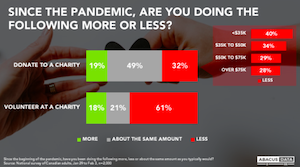 A third of Canadians say they’ve donated less to charities since the beginning of the pandemic. This is from a poll by Abacus Data, a Canadian company that conducts research and provides counsel to corporations and advocacy groups. It surveyed 2,000 Canadians from Jan. 29 to Feb. 3, 2021, and discovered that 60% are volunteering less and, overall, donations have decreased significantly from donors in lower income brackets. Insights related to these and other results are in Charities and the Pandemic: They need us now more than ever.
A third of Canadians say they’ve donated less to charities since the beginning of the pandemic. This is from a poll by Abacus Data, a Canadian company that conducts research and provides counsel to corporations and advocacy groups. It surveyed 2,000 Canadians from Jan. 29 to Feb. 3, 2021, and discovered that 60% are volunteering less and, overall, donations have decreased significantly from donors in lower income brackets. Insights related to these and other results are in Charities and the Pandemic: They need us now more than ever.
 Imagine Canada’s Sector Monitor: Ongoing Effects of the COVID-19 Pandemic (Feb. 2021) reports on how more than 1,000 charities are faring nearly a year after the pandemic’s start, including the increases in demand for services, the softening of revenue streams, the impact of federal government support measures and the impacts to staff well-being.
Imagine Canada’s Sector Monitor: Ongoing Effects of the COVID-19 Pandemic (Feb. 2021) reports on how more than 1,000 charities are faring nearly a year after the pandemic’s start, including the increases in demand for services, the softening of revenue streams, the impact of federal government support measures and the impacts to staff well-being.
 This packed, seven-page Coronavirus Response Charity Toolkit (Jan. 2021), from NPC, a think tank in the UK, offers practical ideas for how charities can manage the changes needed to response to the COVID-19 crisis. NPC publishes free charity research, insights and resources.
This packed, seven-page Coronavirus Response Charity Toolkit (Jan. 2021), from NPC, a think tank in the UK, offers practical ideas for how charities can manage the changes needed to response to the COVID-19 crisis. NPC publishes free charity research, insights and resources.
 Canadian foundations are adapting their funding in response to the COVID crisis. This report (Nov. 2020) includes data from Philanthropic Foundations Canada‘s interactive mapping of foundation grantmaking, from a national panel of foundation leaders surveyed monthly by Carleton University’s MPNL research team. The report also includes a series of case studies undertaken by PhiLab at Université du Québec à Montréal.
Canadian foundations are adapting their funding in response to the COVID crisis. This report (Nov. 2020) includes data from Philanthropic Foundations Canada‘s interactive mapping of foundation grantmaking, from a national panel of foundation leaders surveyed monthly by Carleton University’s MPNL research team. The report also includes a series of case studies undertaken by PhiLab at Université du Québec à Montréal.
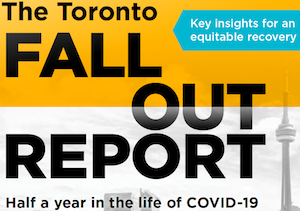 The Toronto Fallout Report (Nov. 2020), from the Toronto Foundation, offers a detailed analysis of effects of the first six months of COVID-19 on Toronto, assessing the effects on health, work, housing, arts and culture, and civic engagement and a sense of belonging. The method and findings have relevance for cities across Canada.
The Toronto Fallout Report (Nov. 2020), from the Toronto Foundation, offers a detailed analysis of effects of the first six months of COVID-19 on Toronto, assessing the effects on health, work, housing, arts and culture, and civic engagement and a sense of belonging. The method and findings have relevance for cities across Canada.
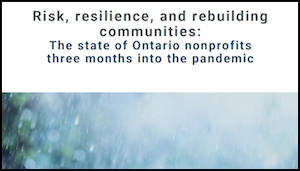 From the Ontario Nonprofit Network and the Assemblée de la francophonie de l’Ontario (Aug. 2020): The survey presents results from 1,131 organizations, showing that 40% of nonprofits in Ontario are likely to close in six months and 40% are facing increased demands for programs and services. The report recommends including nonprofits in economic-recovery plans at federal and provincial levels and providing immediate financial support to nonprofits.
From the Ontario Nonprofit Network and the Assemblée de la francophonie de l’Ontario (Aug. 2020): The survey presents results from 1,131 organizations, showing that 40% of nonprofits in Ontario are likely to close in six months and 40% are facing increased demands for programs and services. The report recommends including nonprofits in economic-recovery plans at federal and provincial levels and providing immediate financial support to nonprofits.
 From Imagine Canada (May 2020): Charities are reporting lower revenues and significant layoffs. This report shows how arts and recreation organizations are facing challenges and how innovation has become central to responding to the pandemic.
From Imagine Canada (May 2020): Charities are reporting lower revenues and significant layoffs. This report shows how arts and recreation organizations are facing challenges and how innovation has become central to responding to the pandemic.
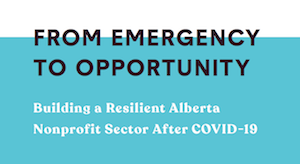 From the Calgary Chamber of Voluntary Organizations (July 2020): The CCVO report notes that it’s not too late for organizations to develop an emergency plan or to take stock of how their plan is working. It’s full of details for emergency preparation and response (preparing workplaces, establishing partnerships, informing and empowering staff, fundraising, etc.)
From the Calgary Chamber of Voluntary Organizations (July 2020): The CCVO report notes that it’s not too late for organizations to develop an emergency plan or to take stock of how their plan is working. It’s full of details for emergency preparation and response (preparing workplaces, establishing partnerships, informing and empowering staff, fundraising, etc.)
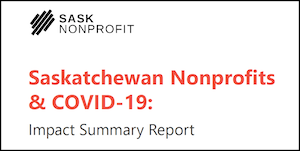 The Saskatchewan Nonprofit Partnership (April 9, 2020) notes that organizations have minimal financial reserves and are altering programs — and many organizations in the province have closed altogether. A significant portion of Saskatchewan’s population will be affected by the modifications or cancellations. More than 520 Saskatchewan nonprofits and charities participated in this survey.
The Saskatchewan Nonprofit Partnership (April 9, 2020) notes that organizations have minimal financial reserves and are altering programs — and many organizations in the province have closed altogether. A significant portion of Saskatchewan’s population will be affected by the modifications or cancellations. More than 520 Saskatchewan nonprofits and charities participated in this survey.
 From the Angus Reid Institute (September 17, 2020): At a time when Canadians say they need more services and help, the Institute’s public opinion survey reports that COVID-19 has curtailed donor giving and the WE affair has weakened trust in charities. Donors are giving less than they were before the pandemic. Many are donating to smaller, local charities more, as opposed to larger, national organizations.
From the Angus Reid Institute (September 17, 2020): At a time when Canadians say they need more services and help, the Institute’s public opinion survey reports that COVID-19 has curtailed donor giving and the WE affair has weakened trust in charities. Donors are giving less than they were before the pandemic. Many are donating to smaller, local charities more, as opposed to larger, national organizations.
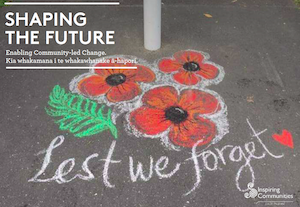 From Inspiring Communities, New Zealand (2020): Learn what worked in a country that did a remarkable job in containing the pandemic. The report has valuable lessons for Canada in how to support community-led resilience and rebuilding, such as devolve funding and power to local communities, tolerate more risk, increase collaboration, and build local economic resilience while redefining ‘shovel ready.’
From Inspiring Communities, New Zealand (2020): Learn what worked in a country that did a remarkable job in containing the pandemic. The report has valuable lessons for Canada in how to support community-led resilience and rebuilding, such as devolve funding and power to local communities, tolerate more risk, increase collaboration, and build local economic resilience while redefining ‘shovel ready.’